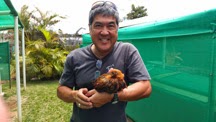 When most people think of a therapy animal, the most common one that comes to mind is a dog, not a chicken. Dogs are a big part of animal-assisted therapy and animal-assisted activities, yet I commonly incorporate our feathered foul into our visits. It attracts a lot of attention and curiosity, besides the many other animals that bring joy and improve well-being for patients of all ages.
When most people think of a therapy animal, the most common one that comes to mind is a dog, not a chicken. Dogs are a big part of animal-assisted therapy and animal-assisted activities, yet I commonly incorporate our feathered foul into our visits. It attracts a lot of attention and curiosity, besides the many other animals that bring joy and improve well-being for patients of all ages.For 15 years, I have visited thousands of patients with a variety of types of therapy animals: dogs, rabbits, guinea pigs, ducks, pygmy goats, miniature horses, ducks and chickens. Each animal requires training to ensure they have the temperament and behavior suitable to visit patients at hospitals and facilities (Alzheimer's wards, adult day care, convalescent and rehabilitation centers, centers for children and adults with disabilities/special needs, and hospice homes).
 A therapy chicken requires training from the day of hatch so that it imprints on humans. The baby chick must be taken from its mother hen, and live with its human parent and receive hours of daily handling and care. This type of imprinting can be some of the most heartwarming bonding between the baby chick and people. The chick quickly becomes very friendly and attached to its' human parent and associates all humans as friendly and approachable. People enjoy petting the chicken and feeding it by hand.
A therapy chicken requires training from the day of hatch so that it imprints on humans. The baby chick must be taken from its mother hen, and live with its human parent and receive hours of daily handling and care. This type of imprinting can be some of the most heartwarming bonding between the baby chick and people. The chick quickly becomes very friendly and attached to its' human parent and associates all humans as friendly and approachable. People enjoy petting the chicken and feeding it by hand.Here is a partial photo documentary of our chick in training:
 |
| 2 day old chick Introduction to an Aquarium Socializing to fish and desensitization of bubbling noises |
 |
| 4 days old Socialization to rabbits |
 |
| 5 days old Socialization to elderly, guinea pigs, rabbits and hospital setting |
 |
| 9 days old Socialization to children, animal education class |
16 days old
Socialization to dog and hospital visit
Socialization to dog and hospital visit
 |
| 24 days old Smart Phone Interaction Socialization towards electronic devices |
 |
| 29 days old Socialization to rooster Mufasa |
 |
| 31 days old Socialization to pony |
 |
| 38 days old Socialization to goat |
56 days
Socialization to large horse
Socialization to large horse
66 days
Interactions with people
Interactions with people
As you can see above, we socialize the chick to a variety of animals, people and situations. Our chick, Lil Piiholo "Lil P" is still growing and presently in its' pullet or cockerel stage. Consider it the stage of being a teenager. They are much more curious and getting into mischief, yet friendly and sweet. Sex is not determined until the adult feathers have come in from molt, but generally by 6 months of age we can determine whether it is a rooster or a hen.


%2BPiiholo%2B3-26_edited-1.jpg)

